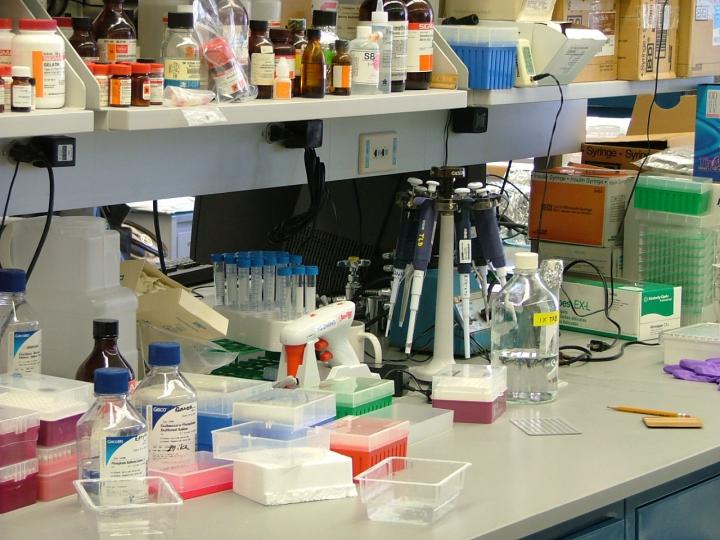
Credit: Johns Hopkins Kimmel Cancer Center
Researchers at the Johns Hopkins Kimmel Cancer Center discovered a combination of a cancer vaccine with two checkpoint drugs reduced pancreatic cancer tumors in mice, demonstrating a possible pathway for treatment of people with pancreatic cancers whose response to standard immunotherapy is poor.
Results of the experiments combining an immune system booster vaccine called PancVAX with two checkpoint drugs derived from anti-PD-1 and agonist OX40 antibodies were published in the journal JCI Insight in October 2018.
The findings showed by using PancVAX with the checkpoint drugs, pancreatic tumors had a better response to therapy by converting T cell-poor tumors into tumors that are rich in specific T cells. T cells are critical cells of the immune system to recognize and kill cancer cells.
Because T cell deficiencies are common in pancreatic and other kinds of cancers with fewer genetic mutations, researchers in recent years have increasingly experimented with immunotherapy drugs that — individually — draw only a weak response, but in combination appear to work better.
Corresponding author Neeha Zaidi, M.D., an oncology fellow at the Kimmel Cancer Center, said one major challenge is to find ways to induce T cells to get into the tumor microenvironment, and her team’s latest experiments add to evidence that tumor vaccines in combination with checkpoint modulators may be an effective way to achieve this.
“The vaccine tunes in the signal of the tumor for therapy, and the checkpoint drugs amplify the signal to teach the immune system to go after the tumor,” Zaidi said. “This framework is a personalized strategy to go after pancreatic and other nonimmunogenic cancers.”
After the mice received the combination treatment and had their tumors cleared, reintroduction of tumor cells did not develop, indicating a memory of the T cells to target the cancer. Elizabeth Jaffee, M.D., senior author of the study and deputy director of the Kimmel Cancer Center, said the combination approach has promise for patients who are or become resistant to immunotherapy drugs after a recurrence of their tumors. But she cautioned that more animal studies and clinical trials for safety and value will be needed before the combination can be used in humans. The combination is not currently available to people, and potential costs are unknown.
“We have already seen some promise with current vaccines being tested in patients with this cancer,” Jaffee said. “We now have the next generation of vaccines that are more specific to each patient’s own cancer, and we have reason to hope that a combination drug approach will offer more to patients.”
Pancreatic cancer is a particularly challenging disease, because there are many barriers to generating a robust immune response within the tumor. Zaidi said there are plans for pilot clinical trials for pancreatic cancer patients with advanced cancers within the next year or so.
According to the National Cancer Institute, deaths from pancreatic cancer accounted for more than 7 percent of all cancer deaths in 2018. It remains one of the most lethal malignancies because by the time it is diagnosed, it has generally spread beyond its original site.
Pancreatic cancer is the fourth leading cause of deaths due to cancer in the United States, with a median survival of less than six months.
Corresponding author Mark Yarchoan, M.D., assistant professor of oncology at the Kimmel Cancer Center, said, “This work is very exciting and supports further testing of this treatment combination in patients with pancreatic cancer, and perhaps other cancers as well that have so far not responded to immune checkpoint inhibitor therapies.”
###
In addition to Zaidi, Jaffee and Yarchoan, study participants included Heather Kinkead, Alexander Hopkins, Eric Lutz, Annie Wu, Kayla Cruz, Skylar Woolman, Teena Vithayathil, Laura Glickman, Chudi Ndubaku, Sarah McWhirter, Thomas Dubensky and Todd Armstrong.
The research was supported by the James W. and Frances Gibson McGlothlin Foundation, The Skip Viragh Center for Pancreatic Cancer at Johns Hopkins, The Bloomberg~Kimmel Institute for Cancer Immunotherapy at Johns Hopkins, the National Cancer Institute (R01 CA18492-04 and R01 CA19729603), Pancreatic Cancer Action Network-AACR Career Development Award (13-20-25-LUTZ); and a Stand Up To Cancer-Lustgarten Foundation Pancreatic Cancer Convergence Dream Team Translational Research Grant (SU2C-AACR-DT1414).
COI: Under a licensing agreement between Aduro Biotech Inc. and The Johns Hopkins University, the University and EMJ are entitled to fees and royalties on sales of certain cancer vaccine products. This arrangement has been reviewed and approved by the Johns Hopkins University in accordance with its conflict of interest policies.
Media Contact
Larry Frum
[email protected]
443-287-2539
Original Source
https:/




